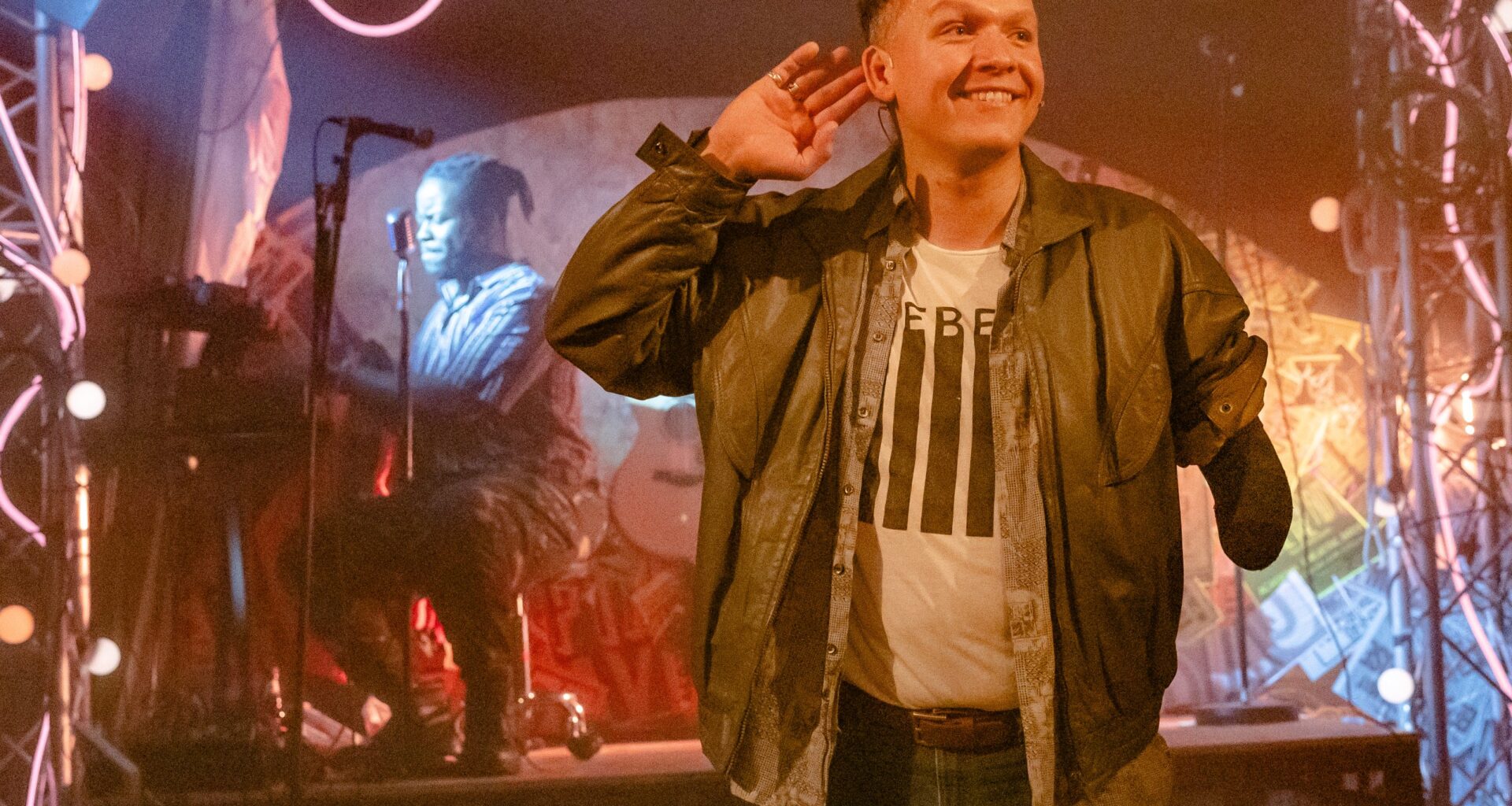Writer: Alex Urwin
Director: Bronagh Lagan
Alex Urwin’s two-hander Brixton Calling adapts Simon Parkes’s bestselling 2014 memoir about creating the iconic South London music venue, The Brixton Academy. Part bioplay with music and part cultural history, the piece never quite shakes off the flattering self-mythologising of its source material. There is more than a hint of a self-celebratory hero’s journey in its depiction of what some see as Parkes’s occasionally unorthodox business practices.
Still, Bronagh Lagan’s direction fizzes with energy, and the well-selected 80s and 90s songs veer just on the right side of jukebox, foregrounding the story over the music. Add in two notable performances from Max Runham as the gritty, self-deprecating Parkes, and Tendai Sitima as his energetic sidekick Johnny Lawes and what emerges is an enjoyable, if a tad overlong evening.
Urwin’s linear narrative begins in the mid-1970s at the tough Gordonstoun school in Scotland, where teenage Parkes gains a reputation as a feisty scrapper, one supposes partly as a reaction to having a thalidomide-related underdeveloped arm. A classmate of Prince Andrew (who “sweats like you wouldn’t believe”, Parkes tells us), the boy bunks off classes regularly to catch a train to London, there to buy scalped tickets to whatever gig he can find. “You do know you’ll never be a rock star”, his career adviser tells him. This turns out to be true, though a love of music is already embedded deep in his soul, as is a dislike of unsolicited guidance.
From Gordonstoun, Parkes takes away faith in the power of seat-of-your-pants bravado, near-unhinged self-belief, and the oft-repeated, self-motivating mantra “work it out, no excuses”. Fortuitously, it also links him into a posh Holland Park-based network of assorted “lawyers, bankers, and wankers”. Being the grandson of one of the wealthiest men in the UK does not, one supposes, necessarily detract from the lad’s capacious sense of self-esteem. Urwin’s mostly uncritical narrative hints at destiny and a flawed hero; the excessively cynical might idly wonder whether our protagonist, who has a ship named after him, was born on third base and thinks he hit a triple.
A chance trip to Brixton in the early 1980s leads Parkes to stumble upon a former musical hall theatre and cinema, now largely used as a storage space and marked by “darkness and the stench of a beer-soaked floor”. Leaseholders Jim and Bob (Runham and Sitima, both talented mimics, take on a host of well-drawn minor characters) sell the venue for £1 in return for a ten-year beer concession. The Brixton Academy is born, and Brixton Calling’s hitherto pedestrian momentum fires up notably.
The subsequent storyline explores the location’s diverse early mix of punk, indie, goth, metal, reggae, and hip-hop performers, its significance as a rehearsal space and venue for political agitation (Arthur Scargill was never charged on the basis his cronies drunk like fishes), and its later success as a location for more mainstream, high-profile gigs.
Most enjoyable is a manic excursion into the early 1990s rave scene, where the performers dally with drag queens and pogo as if their lives depended on it. Antagonists come in the form of dodgy promoters, local protection rackets (“send me in your CVs”, Park tells a pair of heavies), stabbings, drug dealers, racist police, riots, and IRA bomb threats. Only once do we ever see the protagonist doubt himself, and then only momentarily.
Though subjective and centred on one perspective, Brixton Calling is indubitably effective in detailing the transformational role of the Brixton Academy in both the economic regeneration and cultural identity of Brixton from the 1980s onward. The opportunities it afforded Black British musicians and its symbolisation of South London as an emerging creative hub are enduring legacies. The show’s evocative musical palette includes covers of Blondie, Billy Ocean, Bob Marley, and The Clash, amongst others.
Singer-songwriter Runham has a tremendous vocal range and brings charisma and wry humour to an immensely energetic turn as Parkes. A likeable Sitima charms, sings impeccably, plays mean guitar and keyboards, and makes the most of the show’s best comic moments. Nik Corrall’s clever set impresses, too: urban metal light-rigging, bare wood, a graffiti background, and a floor that is mostly a mosaic of gig flyers. Setting aside its inclination towards hagiography, for anyone who came of age in London in the 80s, Brixton Calling is a welcome blast from the past.
Runs until 16 August 2025
